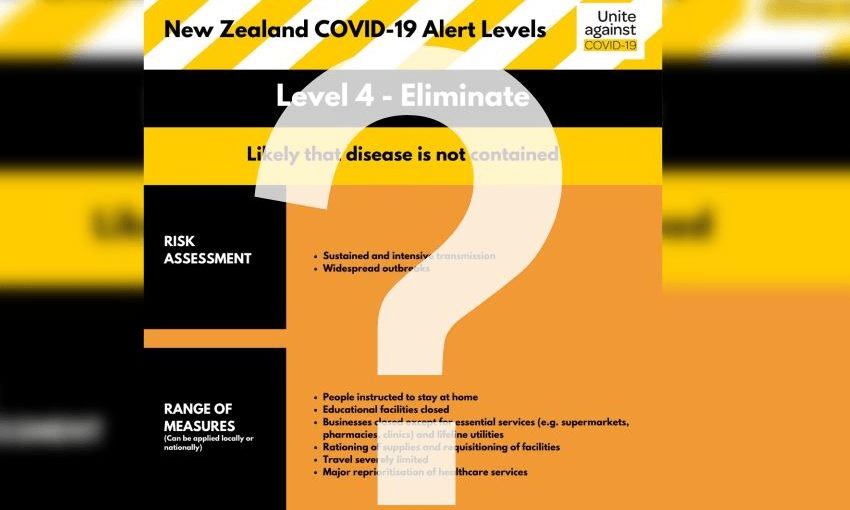Kevin Ward, an urgent primary care physician, is behind a petition urging the government to shift to the highest alert level. Danyl Mclauchlan spoke to him.
On Saturday the prime minister revealed the nation’s four-level Covid-19 alert system. We’re currently on level two, which means, among other things, that people aged 70 and over should self isolate, avoid moving around the country and work from home if possible.
A number of people, including epidemiologists Michael Baker and David Skeggs, as well as the Teaching Council and a separate group of hospital doctors, are arguing to move to level four immediately. Others have noted the risks of moving the dial too suddenly in terms of public support and preparedness.
At his media briefing today, the director general of health, Ashley Bloomfield, confirmed an increase in the confirmed cases of Covid-19 in New Zealand to 102. Two of those are being treated as community transmission. He said: “The prime minister will update the country later on the alert level, which is a result of and informed by those cases of community transmission.”
Four is the highest level of alert – being various described as a “lockdown” or a “shutdown” – in which schools, universities and all non-essential businesses close, and everyone except essential workers remains in their home.
I spoke with Dr Kelvin Ward, an urgent primary care physician who believes that our government needs to avoid the mistakes of other countries now suffering from widespread infections and soaring fatality rates.
Dr Ward’s petition, which has been signed by around 3,000, including many front-line healthcare workers, calls for:
- Quarantine (not self-isolation) of Covid-19 positive patients
- Extensive testing and contact tracing
- Self-isolation of all asymptomatic contacts
- Mandatory social lockdown
The conversation has been edited for length and clarity.
Are you seeing patients presenting to you with the symptoms of Covid-19?
We’ve been seeing them since last Monday. And that’s a worry because the virus can have a long incubation period. I’m not an epidemiologist, but I can speak to this as an urgent care physician working on the ground. People get infected and it can take from several days to over a week to develop symptoms. But you might be infectious during that time and pass the virus onto other people. And you might not get sick at all but function as an asymptomatic carrier and spread the virus on to others, who might then become very sick, or even die.
It helps to think of the outbreak as an iceberg. There’s a tiny sliver of it visible above the water, and that represents the confirmed cases you see in the testing and read about in the media. But that number can represent a much larger number of cases beneath the surface, not yet visible. And for public health authorities the lag time between infection, developing symptoms and being tested means you’re always behind the game, and every hour you wait the sliver above the water gets a little larger, but the iceberg itself gets a lot larger.
Will the government’s response to date allow us to prevent the kind of outbreak we’re seeing overseas?
We have seen some tourists who simply did not self-isolate. It’s the same with returning New Zealanders. Instead some people are coming back, getting on domestic flights, going out into the community. You saw that in Auckland over the weekend. Someone who has now tested positive for the virus came back from overseas and went to a school and now the school is closed. Returning New Zealanders will go home and infect their family members. And some people aren’t practising social distancing. The bars on Courtney Place were all full on Friday and Saturday night. The fatality of the virus correlates with age, but young people need to understand that they can catch it, they can spread it to other people who might die, and they themselves can become very, very sick and require hospitalisation.
It’s not like the flu. You absolutely do not want this.
What we need to do is quarantine returning New Zealanders. It makes no sense to tell people they need to self-isolate and then put them on another plane going somewhere else in the country, or a bus into the city, or send them back to a home filled with family members.
Why do you think we haven’t gone there yet? The government is being advised by experts who surely have the best overview of the situation.
We know what has worked in other nations that have controlled the pandemic. Quarantine of positive Covid-19 patients. Not self-isolation, because that obviously doesn’t work for some people. Extensive testing and contact tracing. Mandatory social lockdown. If we’re locked down then the virus has nowhere to go. Our curve of infections does not look like the countries currently controlling their outbreaks. It looks like those that now have very widespread outbreaks.
The problem here is that the virus is very fast and very hard to see until it’s everywhere. This creates a situation in which any decision must be made with a high degree of uncertainty. The choice before the government is not about whether we go into lockdown or not. Lockdown will happen. The choice is whether we do it now and prevent the proliferation of the virus, or do it in a few days or weeks when the pandemic is widespread and the public health system is overwhelmed. Those are the choices. And the nature of this crisis means that the government needs to act before they have all the information, and before they know they’re right. Because if you let the virus dictate when you act, many people will die.

